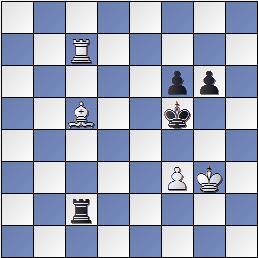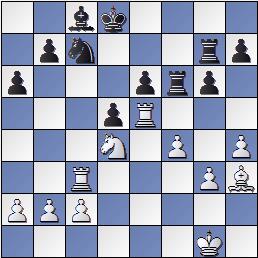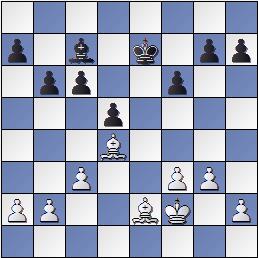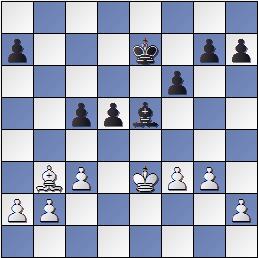We've been examining a variety of chess blunders lately, and will continue to do so in this post. The primary focus has been on blunders that transcend the purely chess aspect, and reflecting on my experience in the game I've thought of three more examples of quite different sorts.
Let's start with the most painful example, from a local g/10 I lost in 2011. The following is an approximation of the position:

I'm White and on move, and while winning would be difficult with less than a minute on my clock (likewise for my opponent) and without an increment, it's clear that I shouldn't lose it. This came at the end of a forcing sequence, and my intention a few moves back was to play either 1.Bd6 or 1.Bb6 - I can't remember now - and it still was upon reaching the position. So I reached out, grasped the bishop, and played...1.Bd4?? My opponent was understandably stunned and suspicious, but after a few seconds of checking and double-checking he took the rook and managed to win before running out of time. I've had some painful losses in my life, but this one, in an otherwise mostly meaningless game, was the only one that literally gave me nightmares!
What was the cause? Maybe the importance of centralization and the aesthetics of putting a bishop on a great square like d4 worked like a sort of muscle memory? Beats me, but it's a horrible feeling when you don't understand why you did something.
The second case is one that faithful comment-readers may have wondered about. Neal Bonrud regularly comments to this blog, but back in 1999 we played in a small tournament in Las Vegas. Things were going well for me on the white side of a French, and this was the position after 29 moves; the first time control was at move 30, and I had plenty of time to make a decision - something like seven minutes.

What should I do? I recall considering 30.Rce3, 30.a4, 30.h5 and probably other moves as well. Can White break through (e.g. with h5 or maybe at some point c4 or even f5)? If not, should he aim to keep squeezing? Open a second front? Find some generic improving move? Finding the perfect move isn't so important here, but I wanted to find the best plan, find the right idea. I kept looking, trying this and then that; always comfortable with my position but unsure of how to convert the advantage into a win. Of course I was keeping an eye on the clock, but there was still enough time left such that I didn't need to make a "practical" decision yet; genuine thought was still possible. So I looked (3 minutes left), looked (2 minutes left), looked (a minute or so left)...and kept looking. At some point I came to a moment of internal resolution and made a decision. I calmly made my move and pressed the clock, and then saw with a mixture of horror and relief that I had done so with one second left. Somehow my focus had grown so deep that I forgot about the clock, and it was just good fortune, sheer dumb luck, that I happened to make the move in time. I'm pretty sure the blood drained from my face for a few seconds after seeing the clock!
The third instance is just amusing, to be filed under "just deserts". I was a piece up in some meaningless, probably unrated online blitz game around 15 years ago, and with two bishops vs. one with no pawn weaknesses and plenty of time on the clock I was a little annoyed that my opponent was playing on. (This is an attitude I've by and large overcome - one simply must in order to play online without going crazy!) The position was something like this:

Here, I uncorked the ridiculous 1.Ke3??, allowing 1...c5 regaining the piece. Argh! Shame on me for switching off mentally, but wait! The game continued 2.Bxc5 bxc5 3.Bd1 Be5 4.Bb3 (something like this - I'm just reconstructing the idea)

and now my opponent played the incredible 4...Kd6?? Of course I responded with 5.f4! and laughed myself silly as he disconnected. Most people learn better from their own mistakes than those of others, but this is carrying things a bit too far!
...
In the next post, we'll look at another interesting error that likewise transcends the realm of pure chess, but is it a blunder or other sort of mental malfunction? Or is it just the cost of doing business? Stay tuned...